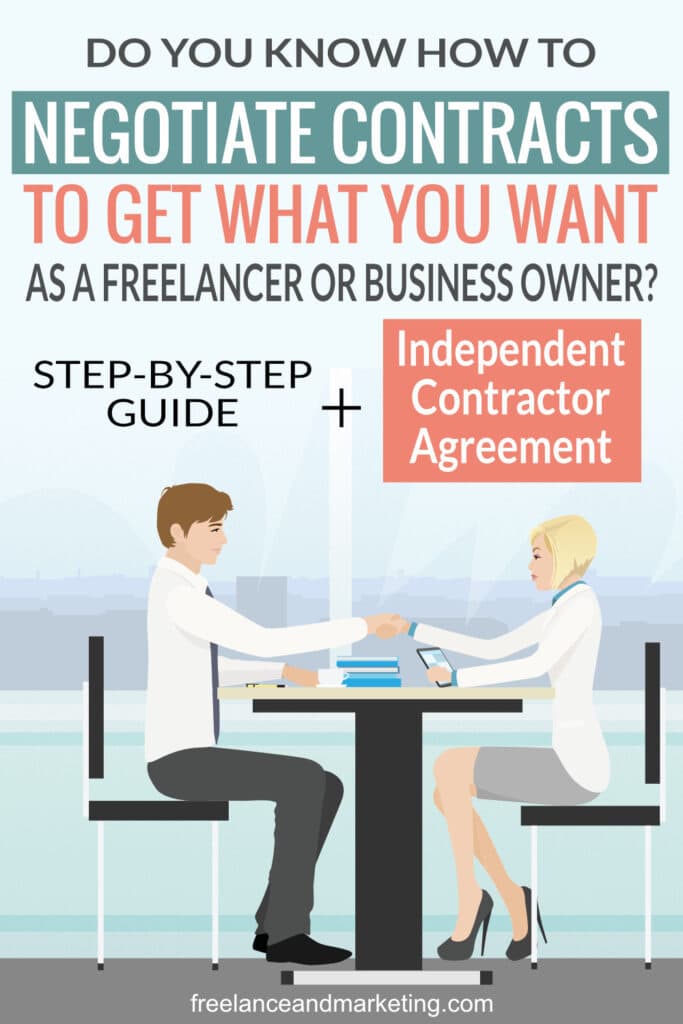How to Negotiate Contracts Successfully to Get What You Want Every Time
Contracts cover a broad variety of topics such as what is a contract, how to create one different types of contracts, essential contract clauses, and so on. In the previous two posts, I talked about in-depth about what are legal binding contracts, and I also covered how to write a business contract. This is post will focus on how to negotiate contracts.
As small business owners, you know that contracts must be a prevailing part of your daily routine. You should never take risks, and must always protect yourself and your business with properly drafted contracts that protect your rights.

Knowing how to negotiate contracts to achieve the best possible result for your business is extremely important.
What is a contract negotiation
Before we begin learning how to negotiate contracts, or best negotiation tactics, first, let’s make sure we all understand what contract negotiation means for you as a business owner.
Every person has tried to negotiate a contract in their lives. From trying to get a cheaper price on something, to asking for a refund or better terms, or keeping your friend’s Xbox a few days longer…all of these are examples of contract negotiation.
👉Do you know what makes contracts legally binding? Read my post to find out what you need for a legal binding contract.
For business purposes, negotiating a contract is the process of “give and take” until both parties arrive at an acceptable or beneficial position. Keep in mind, that when negotiating, your goal is not to put yourself and your business at a 100% satisfaction stage. A contract, especially a business contract, is between parties that are looking to do business together, create some form of a business relationship.
Therefore, this means that negotiating a contract should not be about putting the other party in the worse possible position, and putting yourself in the best possible position. Negotiating a contract means reaching a fair point where all the parties to the contract can live with-all the parties give up something to gain something else.
Remember, that if a contract is solely one-sided, and only benefits you, then this will cripple your future business dealings with that other party because they will have the impression of you that you don’t deal fairly with your business partners or collaborators.
What are the elements of contract negotiation
Knowing how to negotiate contracts successfully means that you must have the elements of contract negotiation in mind. I say elements, but in reality these are are steps and objectives. When one business party mentions that they would like to negotiate a contract, it usually means that there is an element in the contract that they do not agree with, or that it puts them at a disadvantage, or something similar.
In a contract negotiation, you must know or learn about a few important elements when determining whether you will sign the contract as is, or will need to negotiate the terms.
[cp_popup display=”inline” style_id=”14011″ step_id = “1”][/cp_popup]
Some elements of contract negotiation are payment terms, liability, performance timeline, and more. The elements are sections and clauses in the contract that dictate what type of contract it’ll be and what kind of relationship you’ll have.
What are negotiation techniques
There are several contract negotiation techniques that can help you reach better deals, establish better relationships with your potential business partners (even while negotiating the terms), and finally making sure you get what you want.
Here are some tactics to keep in mind when you want to start a negotiation process.
Analyze and learn your bottom line: When going into a negotiation, any negotiation, you’ll be smart to figure out what your bottom line is. If you negotiate aimlessly, without goals and benchmarks, you may walk away with a worse contract than before. The point of negotiation is to change certain things to make it better, fair to you and the other contract party. Know what your bottom line is so that you know how much room you have for negotiating, offering alternatives, or accepting counteroffers.
Lead the process by making the first offer: Generally, the person who makes the first offer leads the negotiation process because then the other party will have to provide a counteroffer if they disagree. This first offer is known as an “anchor” because it stays with the parties throughout the negotiation process.
Don’t counteroffer too low: Regardless of who makes the initial offer, the counteroffer should not be too low. Often, many people get spooked when someone rejects their price point, and counteroffer a low (way lower than they should) number. This is a natural, knee jerk reaction when negotiating because most people want to make an offer that the other party will accept. So naturally, they counteroffer with a too low amount.

I urge you to fight this instinct. Remember that negotiation is a game of give and take. If you counteroffer too low, more often than not you will not be able to raise to the amount that you’re at the very least comfortable with.
Learn to listen and understand the underlying “why” of decisions and needs: As a business owner or entrepreneur, you must always remember that there is an underlying reason, an actual “why” when it comes to every person’s decisions. The underlying reasons are not always obvious, this is the reason why you need to listen actively and try to understand why the other party wants a higher price point or lower price point, or even something that has nothing to do with the price. Once you understand the underlying “why” of reaching a certain decision, you will be in a much stronger position and will know exactly how to negotiate contracts to your advantage.
Ask open-ended questions: In a contract negotiation setting, the goal is to come to an agreement that preferably works for both parties. To reach this step in a negotiation process, you must ask questions. This step builds on the previous tactic, which was to listen and understand the underlying “why”. The key is not to just ask questions but ask open-ended questions. The reason for this is that the other party is put at ease when you’re not suggesting or hinting at conclusions or decisions. With open-ended questions, both sides can come to a decision much easier and with less stress and tension.
Offer several alternatives: By its basic understanding, negotiation is a process where either or both parties will offer alternatives to the problem to reach a final contract that they both can agree on and sign. In a negotiation process, both parties respond better when each party offers more than one alternative to the problem. What this will do is open the doors to free dialogue and discussion. Both parties to the contract will be able to pick and choose alternatives that work for them and reaching a common ground will be easier with several options available to pick from.
Be fair: Last, but not least, being fair and reasonable is a major part of how to negotiate contracts successfully. Every party to the contract wants the contract to protect their interests, business, and put them at an advantage. When dealing with a business contract, it’s not so much about being in a position of advantage, but more that you’re not put in an unfavorable position. Both parties should strive to negotiate and reach a fair result so that their prospective business relationship does not suffer.
What is the Objective of Negotiation
When you’re learning how to negotiate contracts, you need to keep the objective of negotiation in mind. Getting lost in details and more favorable sections for the contract can be easy to do because when the negotiation starts, it’s human nature to want to come out on top.

However, don’t lose sight of your objective, which is to come to a common ground understanding with the other party in order to be able to form a legal binding contract.
Negotiating a contract with a potential business partner or someone you want to do business with carries some responsibilities with it. You must reach an agreement that is acceptable to both parties because the objective of the negotiation is to be able to agree on common contract terms so that both parties will sign the contract and make it the document that will oversee their business transactions.
If you need help writing your business contract, refer back to my previous post.
What is the best way to negotiate
Just like with any aspect of running and managing a business, a contract negotiation also has different methods or options that work for different people and circumstances. Overall, when learning how to negotiate contracts, you’ll discover that there are two main basic principles: the personal or combative approach, and the collaborative approach.
👉Read my detailed post on how to write your own business contracts, what clauses to include and how to make sure you’re covered.
These terms are not formal definitions or terms, but rather they describe what each contract negotiation type entails. In a personal or combative approach, each party to the negotiation adopts a side and condition that puts them at the best possible status and situation. This type of negotiation can take a long time until both parties reach a decision, can create tension and a non-friendly environment.
Even though the personal approach to negotiation is the most common type, it doesn’t mean that it’s the best or correct approach, especially for business dealings.
The other type of contract negotiation that I mentioned was the collaborative approach. What does this mean?
❗️Get 100% customizable and editable, attorney-prepared Contract template for Hiring Independent Contractors and/or Virtual Assistants.
As the name suggests, this negotiation approach is all about collaboration and reaching a common ground together. Usually, all the parties to the contract will get together and take on each contract clause or section together and figure out what works for all of them. This method creates an atmosphere of collaboration and even mutual respect and trust.
There is less stress and tension because all the parties are working together toward a common goal trying to find a fair resolution. This approach is much more preferable because it makes working business relationships stronger from the very beginning.
Conclusion
Every person needs to know how to negotiate contracts to get what they want. Contract negotiation is not just for business owners. You will need to negotiate contracts and terms in an employer-employee setting, as an independent contractor, a freelancer, a blogger, and finally, as mentioned above, a business owner.
Different contracts have different terms and objectives. However, how you approach them and negotiate to end up with acceptable terms and policies remains the same. Do your research, learn to listen, ask open-ended questions, offer more than one alternative solution.
Be fair in your negotiation process, and know your bottom line. These are all tips and tactics that you need to keep in mind whenever you want to negotiate a contract.
Did you like this article? If you found value in it, share it with others.
[cp_popup display=”inline” style_id=”14011″ step_id = “1”][/cp_popup]


Very helpful article and willl use it as a reference point always .